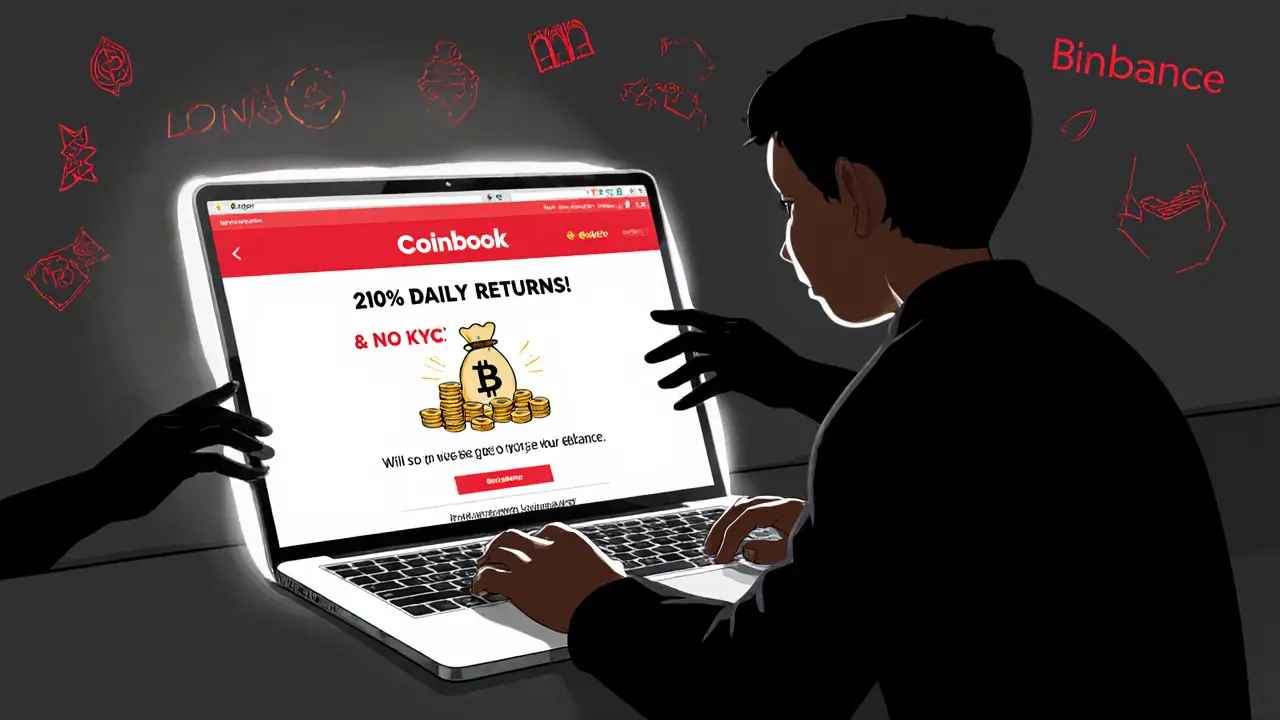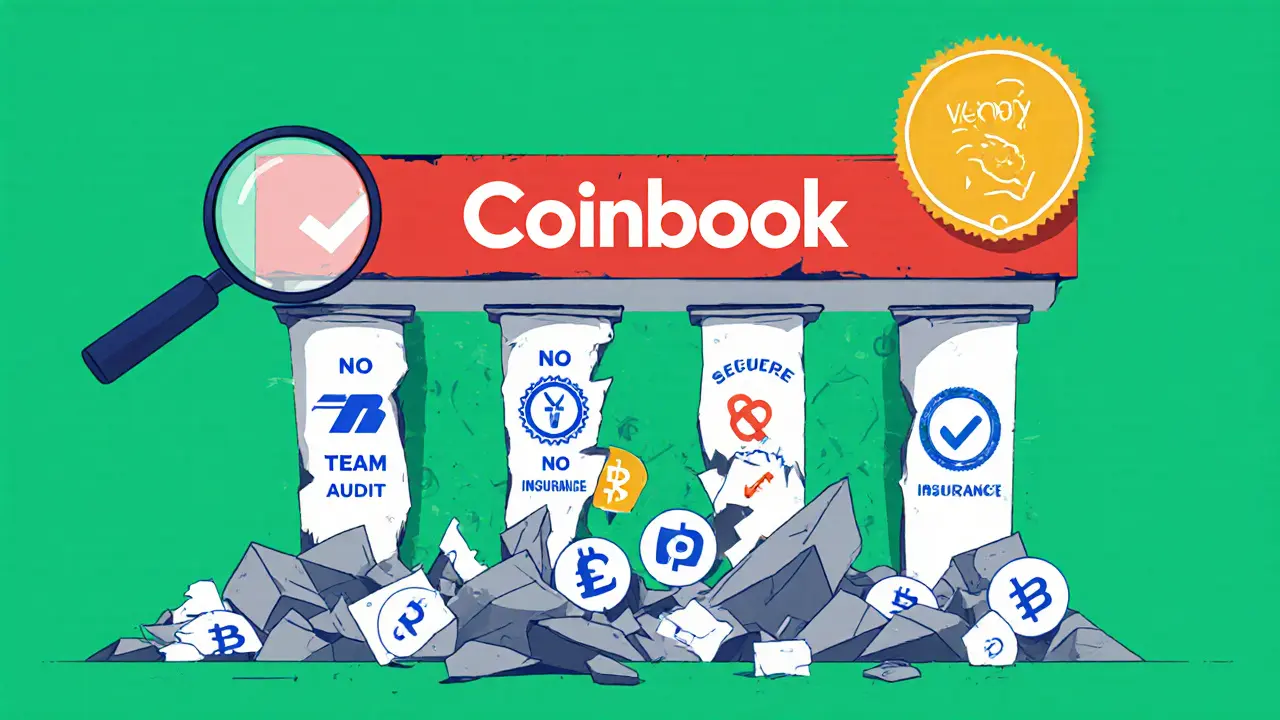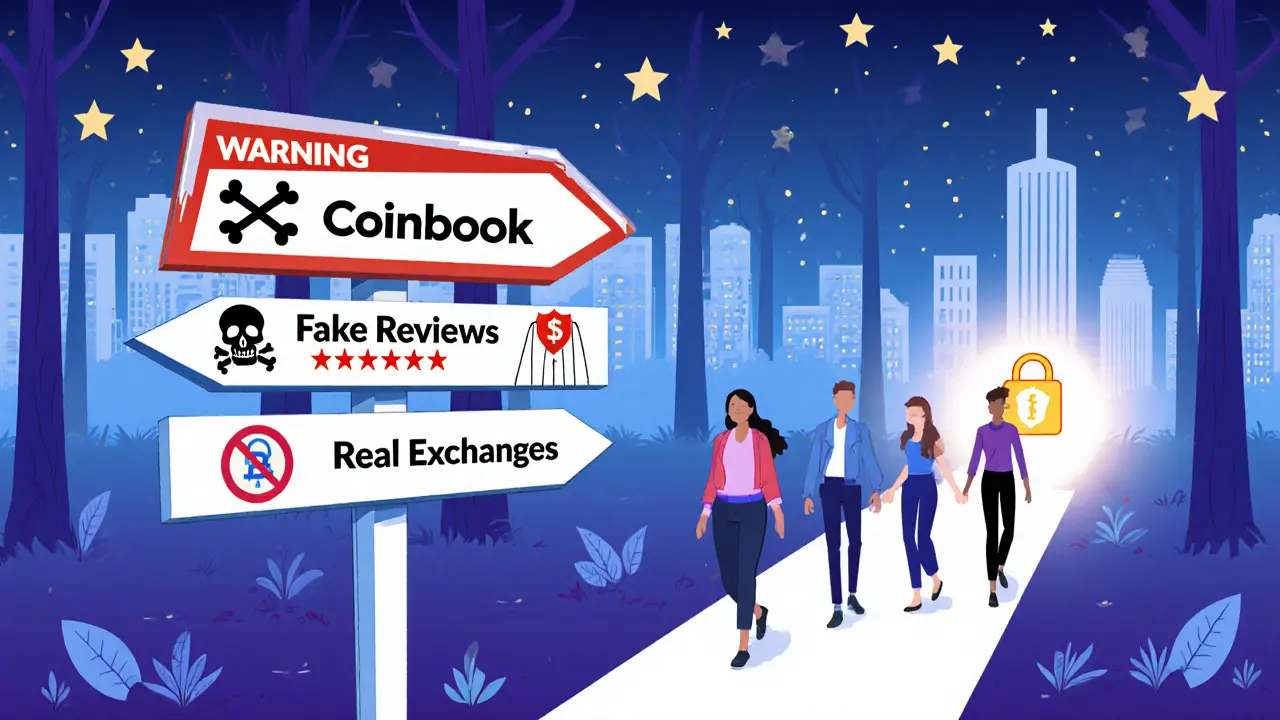
Crypto Exchange Scam Checker
Enter details from the exchange website to see if it matches scam patterns
Enter information you've seen on the exchange website:
- Domain extension (e.g., .io, .net)
- Team member details
- Security practices mentioned
- Where you found reviews
There is no such thing as a Coinbook crypto exchange.
If you’re searching for reviews, sign-up links, or trading details for Coinbook, you’re not alone. Many people type it into Google after hearing the name from a friend, a YouTube ad, or a Telegram group. But here’s the hard truth: Coinbook doesn’t exist as a registered, operational cryptocurrency exchange. No official website, no verified team, no public trading history, no regulatory license, and no user base to speak of. It’s not a hidden gem. It’s not a new startup. It’s not even a typo of Coinbase - it’s a ghost.
That doesn’t mean the name is meaningless. In fact, it’s dangerous.
Scammers know people are looking for new crypto platforms. They see the rising interest in decentralized trading, low fees, and fast withdrawals. So they create fake names - names that sound real, names that mimic real exchanges like Binance, Kraken, or KuCoin. Coinbook is one of them. It’s a trap dressed up as a tool.
How do you know if you’re being targeted? Here’s what to look for.
Red Flags That Coinbook Is a Scam
Scam exchanges like Coinbook don’t need to be fancy. They just need to look convincing enough to trick someone into depositing money. Here are the warning signs you’ll see if you stumble onto a Coinbook site:
- No official domain. Legitimate exchanges have clean, consistent domains like coinbase.com or binance.com. Coinbook might use coinbook.io, coinbook-trading.net, or even coinbook.live - all red flags. Real companies don’t buy cheap, random domain extensions.
- No team or leadership info. Binance has Changpeng Zhao. Coinbase has Brian Armstrong. Kraken has Jesse Powell. Coinbook? No names. No LinkedIn profiles. No press releases. Just a blank page.
- Over-the-top promises. "Earn 20% daily returns!" "Zero trading fees forever!" "Instant withdrawals with no KYC!" If it sounds too good to be true, it is. Real exchanges charge fees. They require identity checks. They don’t guarantee profits.
- No security details. Every major exchange publishes its security practices: cold storage percentages, two-factor authentication, insurance funds, audit reports. Coinbook has none of this. No mention of AES-256 encryption. No cold wallet info. No third-party audit results.
- No user reviews on trusted sites. Check Trustpilot, Reddit, or CryptoCompare. Search for "Coinbook review" - you’ll find nothing. Or worse, you’ll find fake reviews written in broken English, posted the same day, all with five-star ratings.
And here’s the kicker: if you deposit funds into Coinbook, you won’t get them back.
What Happens When You Deposit Into a Fake Exchange
In 2023, hackers stole $2.38 billion from crypto platforms. Most of those were real exchanges with security flaws. But a growing chunk? That was from people who thought they were using a real exchange - and weren’t.
Scam platforms like Coinbook operate like this:
- You sign up using an email and password. No ID needed - they don’t care who you are.
- You deposit cryptocurrency - usually Bitcoin or USDT.
- You see your balance update instantly. It’s fake. It’s just a number on a screen.
- You try to withdraw. The system says "processing." Then "technical issue." Then "your account is under review."
- After a few days, the website disappears. The Telegram group shuts down. The customer support email bounces.
- Your crypto is gone. Forever.
There is no recovery. No legal recourse. No insurance. These platforms are designed to vanish.

How Real Exchanges Handle Security - And Why Coinbook Can’t Match It
Real exchanges don’t just say they’re secure. They prove it.
Take Coinbase. They store 98% of customer assets in cold storage - offline, air-gapped, physically secured. They use multi-signature wallets that require three separate keys to move funds. They undergo quarterly audits by top firms like Grant Thornton. They carry $250 million in insurance coverage for hot wallet losses.
Kraken has been operating since 2011. They’ve never lost customer funds to a hack. Why? Because they use geographically distributed cold storage, strict internal controls, and employee training programs that simulate phishing attacks.
Even Binance, which got hacked for $570 million in 2019, created the Secure Asset Fund for Users (SAFU) - a reserve fund that reimbursed every affected customer. That’s accountability.
Compare that to Coinbook: no fund, no audit, no transparency, no history. Just a website and a promise.
What to Do If You Already Sent Crypto to Coinbook
If you’ve already deposited funds into Coinbook, act fast - but don’t panic.
- Stop sending more. No matter what they say - "deposit to unlock," "pay a fee to withdraw" - don’t send another cent.
- Document everything. Save screenshots of your deposits, emails, chat logs, and URLs. Even if you can’t recover funds, this helps authorities track the scam.
- Report it. File a report with your country’s financial crimes unit. In the U.S., use the FTC’s ReportFraud.ftc.gov. In the EU, contact your national cybercrime center.
- Warn others. Post on Reddit, Twitter, or crypto forums. Use the exact name "Coinbook" so others can avoid it.
Recovery is unlikely, but reporting helps shut down these operations before they hurt more people.

How to Find a Real Crypto Exchange
If you want to trade crypto safely, stick to platforms with a proven track record. Here’s how to pick one:
- Check regulation. Look for licenses from the SEC, FCA, or other recognized bodies. If they don’t mention regulation, walk away.
- Verify security. Do they use MFA? Cold storage? Do they publish audit reports? If not, they’re not safe.
- Read user reviews. Look for patterns. Are people complaining about withdrawals? Slow support? Hidden fees? Don’t ignore them.
- Start small. Even on trusted exchanges, test with a small amount first. See how fast withdrawals go. How responsive is support?
- Use official channels. Never click links from emails, ads, or strangers. Go directly to the exchange’s official website by typing it yourself.
Top choices in 2025 include Coinbase, Kraken, Binance (where available), KuCoin, and Crypto.com. All have years of history, public security practices, and millions of active users.
Final Warning
There is no Coinbook crypto exchange. It’s not under development. It’s not coming soon. It’s a scam.
People lose millions every year because they assume a name sounds official. But in crypto, names mean nothing. Reputation does. Transparency does. Track record does.
Don’t be the next victim. If you can’t find solid, public information about an exchange - don’t use it. Walk away. Even if it looks real. Even if it promises big returns. Even if your friend says it’s legit.
Real exchanges don’t need to trick you. They’ve already earned your trust.
Is Coinbook a real crypto exchange?
No, Coinbook is not a real crypto exchange. There is no official website, no registered team, no regulatory license, and no verifiable user history. It is a known scam platform designed to steal cryptocurrency deposits.
Why do people think Coinbook is real?
Scammers choose names that sound similar to real exchanges like Coinbase or BookCoin to trick users. They use fake websites, fabricated testimonials, and social media ads to create the illusion of legitimacy. Many users mistake the name for a typo of Coinbase and don’t double-check before depositing.
Can I get my money back if I sent crypto to Coinbook?
Recovery is extremely unlikely. Once crypto is sent to a scam exchange, it’s immediately moved to untraceable wallets. There is no customer service, no insurance, and no legal recourse. Your best action is to report the scam to authorities and warn others to prevent further losses.
What are safer alternatives to Coinbook?
Stick to well-established exchanges like Coinbase, Kraken, Binance (where available), KuCoin, and Crypto.com. These platforms are regulated, publish security audits, use cold storage, and have a long history of protecting user funds. Always verify the official website before signing up.
How can I avoid crypto scams like Coinbook?
Never click links from unsolicited messages. Always type exchange URLs directly into your browser. Check for official regulation, read independent reviews, and look for transparency in security practices. If an exchange doesn’t list its team, audit reports, or insurance coverage, assume it’s a scam. When in doubt, wait - the safest trade is the one you don’t make.
Roxanne Maxwell
28 10 25 / 19:15 PMI just lost $800 to something called Coinbook last month. I thought it was a typo for Coinbase, and I was so excited to get into crypto. I didn’t even check the domain - I just clicked the link from a Telegram group. Now I feel so stupid, but I’m telling everyone I know: if it sounds too good to be true, it is. Stay safe, fam.
Still trying to get over it, but at least I’m not silent about it anymore.
Elliott Algarin
29 10 25 / 20:17 PMIt’s weird how the mind fills in blanks. We want to believe there’s a new platform, a better deal, a hidden shortcut. So we ignore the silence - no team, no audits, no history - because we’re hoping the universe will hand us a win without effort.
Crypto doesn’t reward hope. It rewards vigilance.
John Murphy
31 10 25 / 02:23 AMFound a site called coinbook.io yesterday. Looked legit at first glance. Had a dark mode, fake testimonials, even a ‘live chat’ button. I almost sent a small amount just to test it. Thank god I checked Reddit first.
Why do these scams always look so clean? They’re not even trying hard. But we’re desperate enough to believe.
Zach Crandall
31 10 25 / 21:40 PMIt is imperative to note that the proliferation of such phantom entities represents a systemic failure in digital literacy among the general populace. The absence of regulatory oversight in decentralized finance has created a vacuum wherein predatory actors exploit cognitive biases with surgical precision. One must not merely avoid Coinbook - one must actively educate others against the seductive allure of illusory financial innovation.
It is not enough to warn. One must illuminate.
Akinyemi Akindele Winner
1 11 25 / 06:18 AMMan, this Coinbook thing is a scam? Nah bro, it’s just the government trying to scare you off the real money. You think they want you to be rich? Nah. They want you stuck in your 9-to-5, sweating over your 401k while they print money like confetti.
Coinbook? Maybe it’s a decentralized DAO run by anonymous devs who just want to flip the script. You ain’t seen the future yet, bro. You just got brainwashed by the big exchange cartel.
MANGESH NEEL
2 11 25 / 14:41 PMPeople who fall for Coinbook are not victims - they’re negligent. You didn’t check the domain? You didn’t verify the team? You didn’t even Google the name before sending crypto? You’re not a victim of a scam - you’re a walking case study in why crypto will never go mainstream.
There’s no such thing as a ‘simple’ way to get rich. If you’re too lazy to do 2 minutes of research, you deserve to lose everything. This isn’t a warning - it’s a public service announcement for the intellectually lazy.
Sean Huang
4 11 25 / 11:28 AMWait… what if Coinbook is a government psyop? Like… what if the whole thing is a trap to get people to deposit crypto so they can track wallets and shut down ‘unregulated’ activity? I’ve been reading about Project Lavender… and the NSA has been quietly buying up blockchain analytics firms since 2021…
Maybe Coinbook isn’t a scam… maybe it’s a honeypot. And the real scam is you thinking it’s just a scam. They want you to think it’s fake so you don’t report it. That’s the real trap.
Think deeper. The truth is buried under layers of disinformation. I’ve seen the documents. I’ve seen the redacted emails. Don’t trust the narrative.
:o
Ali Korkor
4 11 25 / 14:15 PMYou got this. It’s okay to feel bad, but don’t let it stop you. Learn from it. Check domains. Never click links. Always go straight to the site. You’re already ahead of 90% of people just by reading this post.
Try again - but smarter. You got this.
madhu belavadi
6 11 25 / 01:48 AMSame thing happened to me. Sent 0.5 BTC to Coinbook. Then they asked for 0.1 BTC to ‘unlock’ it. I sent it. Then they asked for 0.3 BTC for ‘tax clearance.’ I cried. I lost everything. Now I just sit here staring at my wallet. I don’t even care anymore.
Why do people keep doing this to each other?
Dick Lane
6 11 25 / 10:09 AMI’ve seen this script play out a dozen times. Fake name. Fake promises. Fake support. Real losses.
The worst part? The people who fall for it are usually the ones who’ve been burned before. They’re just tired of waiting. They want out. And that’s exactly what the scammers count on.
Be patient. The real ones will still be here tomorrow.
Norman Woo
6 11 25 / 14:21 PMwait… what if coinbook is real but its hidden? like… what if its a private exchange for elite investors and the whole ‘no website’ thing is a cover? i mean… if it was fake why do so many people talk about it on telegram?
maybe its not a scam… maybe its just too advanced for us plebs
also i think the feds are blocking the site to keep it secret
Serena Dean
8 11 25 / 11:55 AMJust wanted to add: if you’re new to crypto, start with Coinbase or Kraken. They’re easy, safe, and have apps that walk you through everything. No need to chase ‘hidden gems’ - the real gems are the ones that don’t vanish overnight.
I’ve been trading since 2017. I’ve seen a hundred fake platforms. None of them paid out. Ever.
Trust the process. Trust the big names. And always, always double-check the URL before you click.
James Young
8 11 25 / 11:55 AMAnyone who gets scammed by Coinbook deserves to lose their money. You didn’t even verify the exchange? You’re not a crypto investor - you’re a tourist who wandered into a casino and handed the dealer your wallet. You didn’t get scammed. You got exposed.
Stop blaming the scammers. Start blaming yourself. And if you’re too dumb to read a 10-minute article before sending crypto - maybe don’t touch it at all.